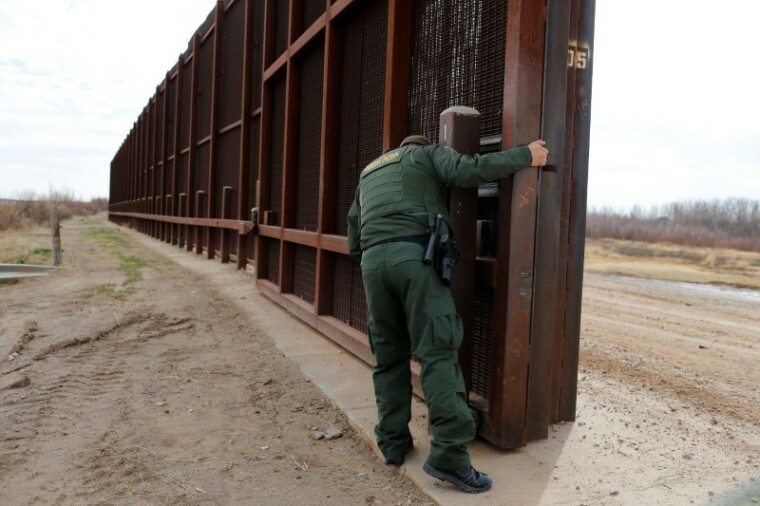Donald Trump to sign executive orders to curb illegal immigration
U.S. President Donald Trump is expected to begin signing executive orders aimed at curbing illegal immigration on Wednesday, beginning with a directive to build a wall along the U.S. border with Mexico and another to boost personnel needed to crack down on illegal immigrants, congressional aides with knowledge of the plan told Reuters.

In the coming days, Trump is expected to limit the number of refugees admitted to the United States to 50,000 a year, down from 100,000, and to impose a temporary ban on most refugees.
Trump, who took office last Friday, will begin signing the orders at the Department of Homeland Security on Wednesday. On Twitter on Tuesday night, Trump reiterated his promise to build the border wall, which was a cornerstone of his presidential campaign and which he has promised to make Mexico pay for.
The border enforcement order includes plans to hire 5,000 more U.S. Customs and Border Protection agents used to apprehend migrants at the border and to triple the number of U.S. Immigration and Customs Enforcement Agents used to arrest and deport migrants living in the United States illegally.
The Customs and Border Protection agency has already struggled to meet its hiring mandate, with a little more than 19,000 agents on the payroll, out of a congressionally mandated 21,000.
Immigration enforcement away from the border is also expected to be strengthened by seeking an end to "sanctuary cities" where local law enforcement officials refuse to cooperate with federal immigration authorities.
Trump will call for an end to this practice and may instruct the federal government to stop providing certain funds to cities that refuse to comply.
Later in the week, Trump is expected to suspend the issuing of visas to people from countries where it is deemed that adequate screening cannot occur. Immigration experts expect those countries to include Syria, Sudan, Somalia, Iraq, Iran, Libya and Yemen.
A review will be conducted by the Trump administration to determine what screening must occur before travel for citizens from such countries can resume.
 Christians don't have to affirm transgenderism, but they can’t express that view at work: tribunal
Christians don't have to affirm transgenderism, but they can’t express that view at work: tribunal Archaeology discovery: Medieval Christian prayer beads found on Holy Island
Archaeology discovery: Medieval Christian prayer beads found on Holy Island Presbyterian Church in America votes to leave National Association of Evangelicals
Presbyterian Church in America votes to leave National Association of Evangelicals Over 50 killed in 'vile and satanic' attack at Nigerian church on Pentecost Sunday
Over 50 killed in 'vile and satanic' attack at Nigerian church on Pentecost Sunday Ukrainian Orthodox Church severs ties with Moscow over Patriarch Kirill's support for Putin's war
Ukrainian Orthodox Church severs ties with Moscow over Patriarch Kirill's support for Putin's war Islamic State kills 20 Nigerian Christians as revenge for US airstrike
Islamic State kills 20 Nigerian Christians as revenge for US airstrike Man who served 33 years in prison for murder leads inmates to Christ
Man who served 33 years in prison for murder leads inmates to Christ


 Nigerian student beaten to death, body burned over ‘blasphemous’ WhatsApp message
Nigerian student beaten to death, body burned over ‘blasphemous’ WhatsApp message 'A new low': World reacts after Hong Kong arrests 90-year-old Cardinal Joseph Zen
'A new low': World reacts after Hong Kong arrests 90-year-old Cardinal Joseph Zen Iran sentences Christian man to 10 years in prison for hosting house church worship gathering
Iran sentences Christian man to 10 years in prison for hosting house church worship gathering French Guyana: Pastor shot dead, church set on fire after meeting delegation of Evangelicals
French Guyana: Pastor shot dead, church set on fire after meeting delegation of Evangelicals ‘Talking Jesus’ report finds only 6% of UK adults identify as practicing Christians
‘Talking Jesus’ report finds only 6% of UK adults identify as practicing Christians Mission Eurasia ministry center blown up in Ukraine, hundreds of Bibles destroyed: 'God will provide'
Mission Eurasia ministry center blown up in Ukraine, hundreds of Bibles destroyed: 'God will provide' Church holds service for first time after ISIS desecrated it 8 years ago
Church holds service for first time after ISIS desecrated it 8 years ago Burger King apologizes for 'offensive campaign' using Jesus' words at the Last Supper
Burger King apologizes for 'offensive campaign' using Jesus' words at the Last Supper Uganda: Muslims abduct teacher, burn him inside mosque for praying in Christ’s name
Uganda: Muslims abduct teacher, burn him inside mosque for praying in Christ’s name